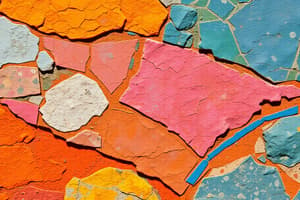Podcast
Questions and Answers
How are clastic sediments formed, and how do scientists classify them?
How are clastic sediments formed, and how do scientists classify them?
Clastic sediments are formed by weathering and erosion. Scientists classify them based on size.
Why do sediment deposits tend to form layers?
Why do sediment deposits tend to form layers?
Because in each case, the particles being carried will settle out, forming layers of sediment.
As sediments are buried, what two factors increase with depth?
As sediments are buried, what two factors increase with depth?
Pressure and temperature increase with depth.
How do pressure and temperature increase cause lithification?
How do pressure and temperature increase cause lithification?
Compare and contrast graded bedding and cross bedding.
Compare and contrast graded bedding and cross bedding.
Is it possible for a layer of cross-bedded strata to show graded bedding as well?
Is it possible for a layer of cross-bedded strata to show graded bedding as well?
Flashcards are hidden until you start studying
Study Notes
Clastic Sediments Formation and Classification
- Clastic sediments are created through the processes of weathering and erosion.
- Scientists classify clastic sediments based on their particle size, ranging from fine silt to coarse gravel.
Sediment Layer Formation
- Sediment deposits form layers as particles being transported settle out according to size and weight.
- Each layer typically represents a period of sediment deposition in different environmental conditions.
Factors Affecting Lithification
- Pressure and temperature increase with depth in sediment layers.
- Overlying sediment weight compresses grains, facilitating physical transformations.
- Temperature in the Earth’s crust rises approximately 30 degrees Celsius per kilometer, which contributes to lithification processes, altering sediments into solid rock.
Graded Bedding vs. Cross Bedding
- Graded bedding is commonly found in marine sedimentary rocks, where particles settle from larger to smaller sizes.
- Cross bedding is characterized by small-scale structures formed by the movement of sediment in wind or water, creating inclined layers.
Cross-Bedded Strata and Graded Bedding
- It is not possible for a layer of cross-bedded strata to exhibit graded bedding as they represent different sedimentary processes and formations.
Studying That Suits You
Use AI to generate personalized quizzes and flashcards to suit your learning preferences.




